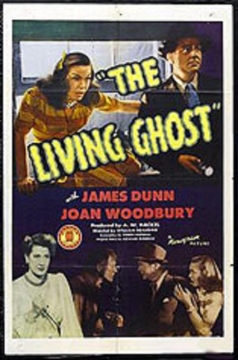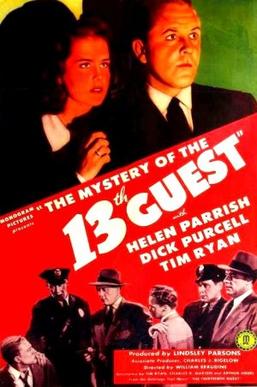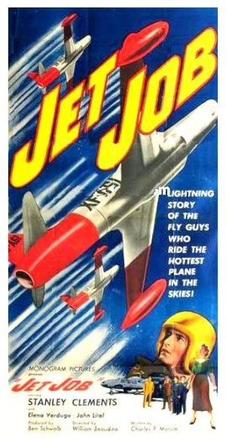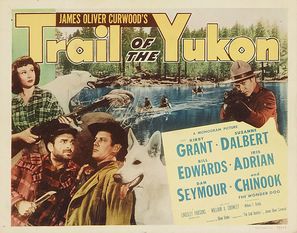
William Washington Beaudine was an American film director. He was one of Hollywood's most prolific directors, turning out films in remarkable numbers and in a wide variety of genres.

Billy the Kid Versus Dracula is a 1966 American horror Western film directed by William Beaudine. The film is about Billy the Kid trying to save his fiancée from Dracula. The film was originally released as part of a double feature along with Jesse James Meets Frankenstein's Daughter in 1966. Both films were shot in eight days at Corriganville Movie Ranch and Paramount Studios in mid-1965; both were the final feature films of director Beaudine. The films were produced by television producer Carroll Case for Joseph E. Levine.

The Ape Man is a 1943 American horror film directed by William Beaudine. The film is based on "They Creep in the Dark" by Karl Brown, which was published in The Saturday Evening Post. It stars Bela Lugosi as Dr. James Brewster who is aided by his colleague Dr. Randall. The doctor manages to transform himself into a ape man hybrid and desperately seeks a cure. Brewster believes that only the injection of human spinal fluid will prove effective as a cure. As Randall refuses to help him, Brewster and his captive gorilla seek involuntary donors.

Invisible Stripes is a 1939 Warner Bros. crime film starring George Raft as a gangster unable to go straight after returning home from prison. The movie was directed by Lloyd Bacon and also features William Holden, Jane Bryan and Humphrey Bogart. The screenplay by Warren Duff was based on the novel of the same title by Warden Lewis E. Lawes, a fervent crusader for prison reform, as adapted by Jonathan Finn.

The Hoodlum is a 1951 American film noir crime film directed by Max Nosseck and starring Lawrence Tierney, Edward Tierney, Allene Roberts, Marjorie Riordan and Lisa Golm.

Blonde Dynamite is a 1950 American comedy film directed by William Beaudine and starring The Bowery Boys. The film was released on February 12, 1950 by Monogram Pictures and is the seventeenth film in the series.

The Living Ghost is a 1942 American mystery-drama film directed by William Beaudine and produced by Monogram Pictures. Starring James Dunn and Joan Woodbury, the film incorporates elements of the horror genre as it follows an ex-private detective who is called in to investigate why a banker has turned into a zombie. As the detective shares wisecracks with the banker's cheeky secretary, the two fall in love. The film was distributed in the United Kingdom under the title Lend Me Your Ear, and later released on home video as A Walking Nightmare.

Shanghai Chest is a 1948 American mystery film directed by William Beaudine and featuring Roland Winters in his third appearance as Charlie Chan.

Fashion Model is a 1945 American comedy mystery film directed by William Beaudine and starring Robert Lowery, Marjorie Weaver and Tim Ryan. The screenplay was written by Victor Hammond and Ryan.

The Mystery of the 13th Guest is a 1943 American crime/mystery film directed by William Beaudine and released by Monogram Pictures. It is based on Armitage Trail's 1929 novel The 13th Guest and is an updated version of the 1932 film The Thirteenth Guest. The film stars Helen Parrish as a young woman who returns to her grandfather's house 13 years after his death to read his will according to his wishes.
Detective Kitty O'Day is a 1944 American comedy mystery film directed by William Beaudine and starring Jean Parker, Peter Cookson and Tim Ryan. The film was intended as an attempt to create a new low-budget detective series, but only one sequel, Adventures of Kitty O'Day (1945), was made.

Adventures of Kitty O'Day is a 1945 American comedy mystery film directed by William Beaudine and starring Jean Parker, Peter Cookson and Tim Ryan. It was a sequel to the 1944 film Detective Kitty O'Day. The two films were an attempt to create a new detective series but no further films were made. A third film, Fashion Model, also directed by Beaudine, was made using a similar formula but with another actress playing a heroine with a different name.

Jet Job is a 1952 American aviation action film directed by William Beaudine. The film stars Stanley Clements, John Litel and Bob Nichols. Jet Job features stock footage of various types of USAF military aircraft.

County Fair is a 1950 American drama film directed by William Beaudine and starring Rory Calhoun, Jane Nigh and Florence Bates. It was a remake of the 1932 film The County Fair, which had also been remade in 1937. A group of locals thwart the plans of a group of criminals to fix a race by doping a horse.

Trail of the Yukon is a 1949 American Northern film directed by William Beaudine and starring Kirby Grant, Suzanne Dalbert and Bill Edwards. It was based on a novel by James Oliver Curwood about a North-West Mounted Police officer and his faithful German Shepherd dog Chinook. It is part of the Northern genre. The film was popular, and inspired Monogram to make a series of nine further films starring Grant and Chinook.
Crazy Knights is a 1944 American comedy horror film directed by William Beaudine and starring Billy Gilbert, Shemp Howard and Max Rosenbloom.

Too Many Winners is a 1947 American mystery crime film directed by William Beaudine and starring Hugh Beaumont, Trudy Marshall and Ralph Dunn. Made and released by Producers Releasing Corporation, it was one of a number of films featuring the private detective Michael Shayne.

Behind City Lights is a 1945 American crime film directed by John English and written by Richard Weil and Gertrude Walker. The film stars Lynne Roberts, Peter Cookson, Jerome Cowan, Esther Dale, William Terry and Victor Kilian. The film was released on September 10, 1945, by Republic Pictures.
The Gambling Man is a British three-part television serial, or long TV movie, first broadcast in 1995, starring Robson Green, directed by Norman Stone, based on a novel by Catherine Cookson.
William Nelson Austin was a Canadian-American film editor. He was nominated for an Academy Award in the category Best Film Editing for the film Flat Top.
















